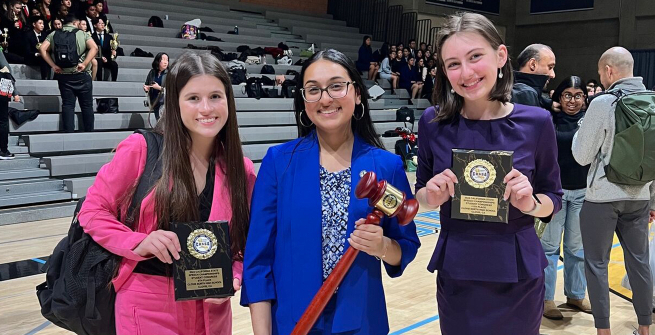Every Saturday as a twelve-year-old, I'd awaken to the sound of my dad starting his SUV, the exhaust stirring in the wet morning fog. I would sleepily stumble into the backseat as the smell of McDonald's hotcakes and hash browns filled the interior of the car. "You ready to go, kiddo?" my dad would ask as he closed the door. We weren’t going to church or even Disneyland (though most days, I wish we were); we were going to watch a varsity congressional debate tournament. I turned to congressional debate as an outlet for advocacy before I could even fully understand its importance. The biggest lesson I learned from being involved with speech and debate at a young age is that our words can ignite change and empower individuals.
For example, as I stood to give my last speech in the final round of the National Congressional Debate Tournament, I knew there were thousands of people watching the livestream and thousands more who would replay this video in their own debate practices. I wanted to inspire and leave these students with a message beyond the political jargon and piles of research: “This event has taught me that there’s no tool more powerful than the power we carry with our voices, so I want to thank every single person in this room for using their voices to fight for change.” As I strung these words together like beads, I could feel how each syllable has the potential to impact people in that event and beyond. I longed to hear a wooden gavel bang and shoot my placard up to question my competitor on section 230 of the Federal Communication Decency Act.
I remember being as young as eleven, sitting in the back of a debate room for hours and being in absolute awe of how the debaters played with speeches like they were marbles, rolling and spinning their arguments onto the floor. I watched how they made the laws of psychology look like suggestions. Though I have been so honored to have received accolades like being one of the youngest debaters to win the California State Championship, the awe I continue to have for the art of public speaking is unshakeable.
Unfortunately, the magical world that oratory unlocked for me is not accessible to all students from every background. For one, glossophobia, the fear of public speaking, is the #1 fear in America. More concerningly, this widespread fear is worsened by wealth inequality. Private schools and schools in higher income areas have the resources and funding to provide adequate curriculum on public speaking to develop oral communication skills. On the other hand, there’s a lack of access to public speaking curriculums for middle and lower-income students, which means these students continue to struggle with the most important skill in the 21st century. My concern is that public speaking is dying, and wealth distribution is one of the culprits.
In 2022, I launched an organization called Project SpeakOut with the goal of providing weekly workshops in accessible spaces like the Porter Ranch, Granada Hills, and Mid-Valley Library branches of the Los Angeles Public Library to help conquer the fear of public speaking. One of my greatest joys has been watching young students fall in love with oratory the same way I did. I watch them timidly walk into my workshops at the library with their bodies hunched over and shaking. Soon, they leave the workshops equipped with tools they can use to speak their minds. One of the most impactful moments in leading Project SpeakOut was when I taught students about advocacy-based speaking and helped them research and deliver their own speeches about a global issue they were passionate about. One student went up to present her speech, and halfway through, tears started to well in her eyes, and then her voice started to quiver. Afterward, she told me that she had never had an empowering space where she could openly advocate for LGBTQ+ rights and that this workshop allowed her to articulate a problem about which she had remained silent. My desire to solve an issue I noticed in the community around me became a space that made meaningful connections and empowered students to, above all, "SpeakOut."
Public speaking means understanding how to balance emotions with analysis, rhetoric, and research to craft messages. Every time I step down from the podium and thunderous applause washes over me, and it's not the applause that lingers; it's the realization that my voice has the power to ignite change.
Debating and Public Speaking Reading List
—Alisha Hassanali

Alisha Hassanali is one of the youngest debaters to win the California State Championship in congressional debate and, at one point, was ranked the top 3 debaters in the country. Her passion and drive for public policy, oratory, and community service helped start her school’s first debate team, coaching and mentoring other students to find their voice. When she's not dissecting the intricacies of foreign policy, Alisha can be found watching Gordon Ramsay shows, obsessing over Bollywood music, or following the latest fashion trends.
—Michael Baradi, Young Adult Librarian, Mid-Valley Regional Branch Library















